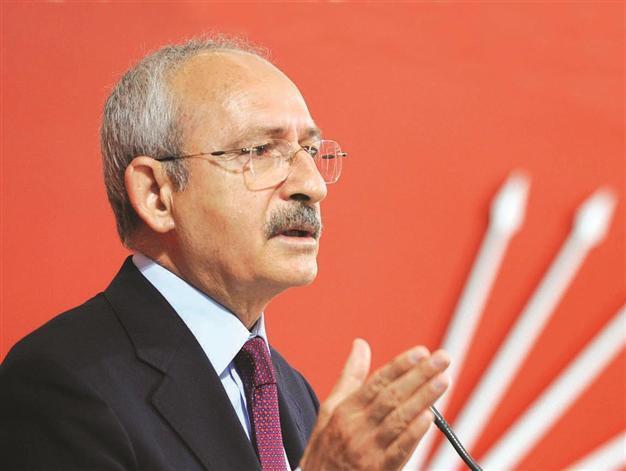CHP refuses to budge on secularism
ANKARA - Hürriyet Daily News

CHP leader Kılıçdaroğlu will have the final say on the party’s charter proposals. DAILY NEWS photo
The main opposition Republican People’s Party (CHP) has shown its will to maintain a strong emphasis on secularism in the new constitution with a proposal to the Constitutional Conciliation Commission that would continue to allow for the closure or banning of political parties considered to pose a threat to the secular republic. The move is likely to provoke reactions from other parties in the commission, as well as civil society.A proposal drafted for the Constitution Conciliation Commission by the CHP argues that political parties that are “the focus of movements against the secular republic” should either be banned from participating in elections or closed down.
The CHP has also proposed that the activities of political parties should not be in violation of “democracy, human rights and republican principles,” and that parties should not promote violence and racism.
All four parties represented in the Constitution Conciliation Commission – the AKP, CHP, Peace and Democracy Party (BDP) and Nationalist Movement Party (MHP) – are expected to submit their opinions on the articles for the fundamental rights and freedoms chapter coon, and the commission is expected to hold its next meeting on Aug. 1.
The CHP’s proposal on party closures is part of its suggestions for the fundamental rights and freedoms chapter.
“If the constitutional process is functioning, there is no reason to object to party closures. If there is law, then there also needs to be a measure,” CHP deputy Atilla Kart, a member of the commission, told the Hürriyet Daily News, firmly defending his party’s proposal.
“If a party is the focus of anti-secular actions or there is a will to destroy pluralist democracy, and if there is a legal measure against these kinds of situations, then no doubt a political party could be closed down,” Kart said.
Political parties in Turkey have frequently been closed by Constitutional Court rulings. Many of those closed have been parties promoting the Kurdish identity or promoting religious values.
The ruling AKP narrowly avoided closure in July 2008, when a complaint that the party was the focus of anti-secular activities failed to receive the support of the required majority of judges.
The European Court of Human Rights has issued a number of judgments finding Turkey guilty of violating the European Convention on Human Rights with regard to the closure of political parties.
‘Turkishness’ and the Constitution
The deputies representing the CHP at Parliament’s Constitution Conciliation Commission have also stepped onto a landmine with disagreement among themselves over the definition of “constitutional citizenship.”
CHP deputies Kart, Süheyl Batum and Rıza Türmen, all representing their party at Parliament’s Constitution Conciliation Committee, are set to meet with CHP leader Kemal Kılıçdaroğlu today in a bid to overcome ongoing differences over the definition of “constitutional citizenship.”
Some Kurdish deputies favor a broader definition of constitutional citizenship, while others insist on maintaining the vague concept of “Turkishness” within this definition.
The debates over the concept of “Turkishness” have long been on the agenda, mainly because of the infamous Article 301 of the Turkish Penal Code, which criminalized “insulting Turkishness.” Following lengthy debates, the article was later changed to “insulting the Turkish nation.”
Some academics have suggested the use of a supra-identity of “being from Turkey,” rather than “Turkishness,” which signifies an ethnic or territorial definition.
















